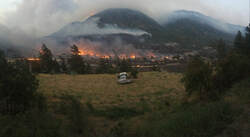|
Photo by nolansadventures via IG We are seeing warmer and drier weather across British Columbia earlier than usual. Hot weather is a significant reason why we are seeing wildfires and extreme fire danger ratings across the province. People at higher risk:Individuals respond differently to smoke exposure; listen to your body and reduce smoke exposure if it is impacting you. The hazards from wildfire smoke vary for individuals depending on how often a person is exposed, the concentration of the particulate and the activity level during exposure. Both older adults and older pets are more likely to be affected by smoke exposure. Children, also have a higher risk because kids breathe in more air per pound of body weight than adults do. Animals with shorter noses, like Boston Terriers and Pugs, have a higher risk of respiratory issues. How does poor air quality affect health?Wildfires can produce dense smoke that contain small particles that can penetrate into our lungs and bloodstream. These small particles are not visible to the human eye. Milder and more common symptoms of smoke exposure include:
If you experience any of these severe symptoms, talk to a health professional or seek urgent medical condition. Signs that your pet might be having difficulty from smoke exposure:
Tips to keep you and your pets safe when air quality is poor:
At the time that this article was released, there were 309 active fires across British Columbia, 26 of those are *wildfires of note, and nearly 70% are suspected to be caused by lightning.
B.C. Wildfire Dashboard *Wildfires of note are wildfires which are highly visible or which pose a potential threat to public safety.
0 Comments
Leave a Reply. |
MORE TO COMECategories |


